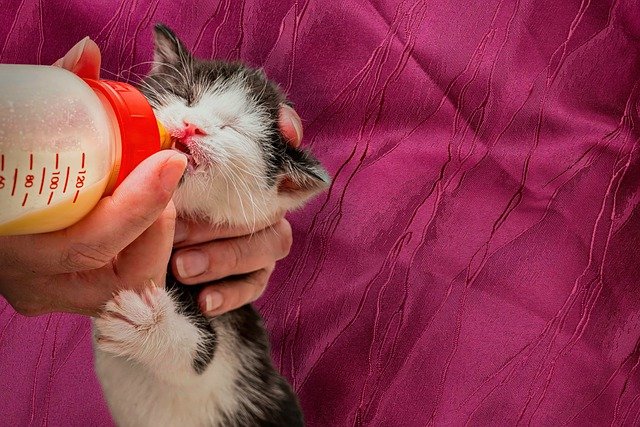Unable to see or hear the world around them, kittens born without hearing or sight entirely depend on milk from their mother for nutrition.
At around four weeks, the kittens will begin eating solid foods and they are weaned at about eight weeks. Mothers are busy throughout the day, caring for their kittens, keeping them clean and warm, teaching them social skills, and helping them urinate and poop within the first three weeks.
If you discover kittens that appear to have been abandoned or your cat isn’t able to take care of their littermates, you might be required to care for the kittens on your own.
If this happens, you’ll have to step in quickly, particularly if your kitten’s eyes remain shut, which indicates that they are less than two weeks old. Follow the guidelines of Perfect Fit on caring for orphaned kittens that keep meowing. This will aid your kittens in developing into healthy, happy cats.
What to do first to make your kittens feel comfortable?
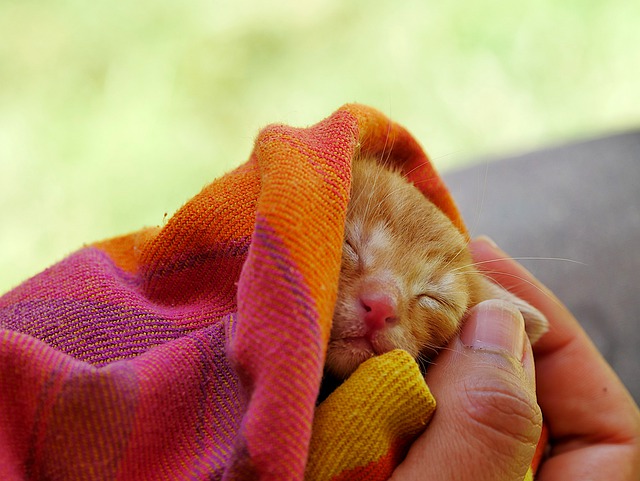
When the mother cat isn’t present to help, then it is crucial that you keep your kittens warm. They aren’t yet able to regulate their body temperature and could quickly fall into hypothermia.
To ensure that your kittens are kept warm, place them in a calm room and out of the way of drafts. The room should keep between 25°C.
You can build them an inviting bed using cardboard boxes stuffed with blankets or buy a kitten bed that is already made.
You can use an infrared lamp or a hot water bottle tightly enclosed in fabric to warm their beds. Make sure that it’s not directly in contact with kittens.
Remember: The stage is more critical if your kitten closed its eyes or partially opened. After warming up, you can immediately take your kittens to the vet.
Determining the age of the kittens.
You can determine their age when your kittens are in a dry, warm area. Based on their age, the kittens will have different needs. There are some aspects to consider that can help you:
- The kitten closes its eyelid in the beginning. They open their eyes after about ten days. Then, they will be fully open somewhere between two and three weeks.
- The kitten’s first teeth (also known as “milk teeth“) appear after three weeks, with the first canine appearing around 3-4 weeks. The 26 primary teeth usually emerge by 6-7 weeks of age.
If you’re not sure of the age, then consult your veterinarian. Whatever the case, it is crucial that you bring your kittens as soon as you can to the vet, who will evaluate their overall health and provide treatment if necessary.
I Want to learn more about:
-
-
Learn the essential information to be able to set up and run your own Pet Sitting business
-
Develop your knowledge on the care, health and welfare of pet animalsAnd Many More…
-
Let’s Look At Feeding
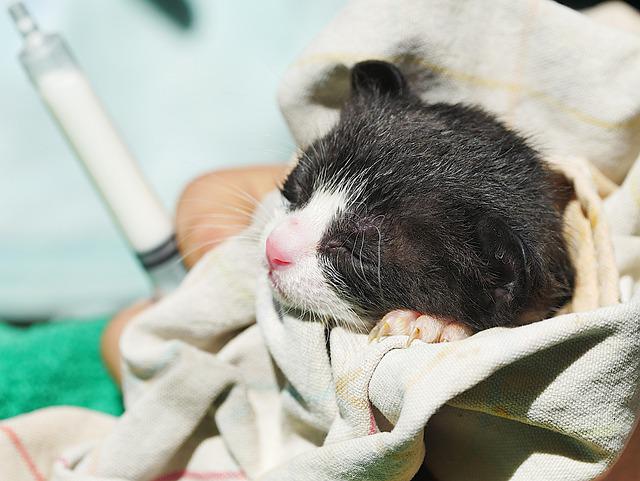
What do kittens that aren’t weaned take in?
At this moment, the kittens will be hungry and let the world know their stomachs are full by mowing pitifully.
Don’t be quick to provide them with empty milk or a cat food bowl. This can cause worse harm than it does good.
In everyday situations, a kitten only requires its mother’s milk from birth until around four weeks. In the meantime, the kittens shouldn’t consume any solid food.
If they are under four, you’ll require feeding them through a bottle using a formula to replace kitten milk. Consult your veterinarian for the most suitable procedure for your kittens.
Be sure to follow the recommended dosage of milk and frequency of feedings as indicated on the label.
How do you feed a bottle-fed kitten?
Once you’ve created the kitten milk substitute formula. warm it by running it through warm water or placing it in an ice-cold glass.
Put your cat on her stomach, and slowly open her mouth using your finger. Insert the nibble. you should hold the bottle at an angle of 45 degrees. to keep the cat from breathing air and the formula.
You can try an eye-dropper or even a syringe if she has issues with the bottle. After she is done with the procedure, grab a warm moist cloth and wash her face.
You can also wipe an incredibly soft and warm cloth on your kitten’s abdomen and the anal area to help her eliminate urine and Fales.
A kitten that is just born may require to eat about 6/8 times daily or every four hours and less often in the first two weeks.
Be assured that you will probably be able to determine the time they require feeding, as hungry kittens can be very loud! Try to make the time for feeding enjoyable for everyone by feeding your kittens in a peaceful location and ensuring that you’re relaxed too.
If your kittens are keeping you up at night, remember that in the end, they’ll be able to rest through the night. Find a method to measure the kittens regularly and accurately to verify that they’re gaining weight in a timely manner.
Note for kittens
Don’t give kittens anything other than kitten milk replacement formula because it is likely to cause upset in their delicate stomachs.
Use this time of suckling to stimulate your kitten’s senses. in the same way that the mother would do in the course of feeding.
If the mother isn’t present. you can promote their hearing, visual and tactile senses by touching them, touching them, and gently speaking to them in their sleep.
Transitioning into kittens solid food: experimenting with new textures and scents
The transition to solid foods will occur between 4 to 7 weeks. At the age of four weeks. it is possible mixing a small amount of wet food into the recipe to make the texture of a soup.
Allow your kittens to adjust to the flavor and slowly increase their intake of wet foods. Around 5 or 6 weeks, you could begin introducing dry foods softened by water.
Be sure to select a high food designed to meet your kitten’s nutritional requirements. Between 7 and 8 weeks of age, they must be weaned and eat solid food.
I Want to learn more about:
-
-
-
How to make your cat your best friend.
-
How to reward your cat.
-
Accustom the cat not to fear the trips at the vet.
-
-
And Many More…
-
Caring
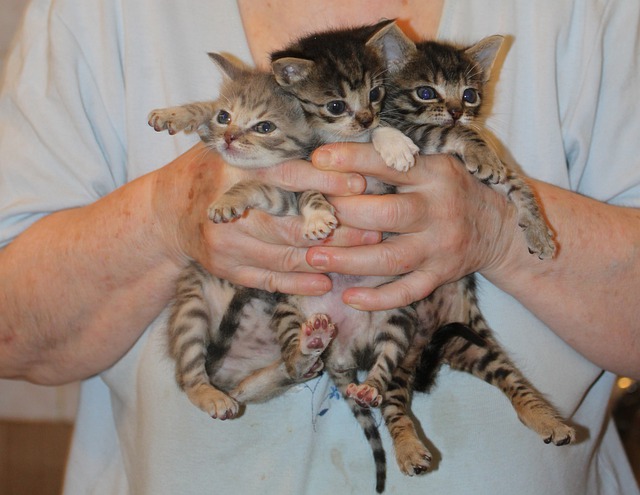
Hygiene: helping your kittens annihilate
It’s not as surprising as it seems that, at the age of four weeks. the kitten isn’t capable of eliminating (i.e., urine or feces) herself.
The cat’s mother usually assists her kitten by stimulating her genital or abdominal areas (The things mothers need to accomplish!).
While I am sure, you aren’t delighted to be told this, if she isn’t around. you will be required to do this at every meal until she can eliminate herself.
Now, you’re likely to be wondering what exactly this procedure entails. It’s pretty simple than it appears. It is essential to gently rub your cat’s tail using a moist, warm cloth or paper towel until she defecates and urinates. The good thing is that after about four weeks, you can put out a shallow litter box for her.
Place her gently in the litter to help her get familiar with the smell. and let her go to the bathroom to wash the scent. Don’t be shocked when you see your kittens sleeping inside the litter.
It could take them some time to understand the process.
Cleaning the kitty
Cats are generally extremely tidy animals. Mother cats spend much time grooming themselves and keeping their babies clean by licking their kittens.
It is crucial for keeping your kittens well-nourished and comfy. Since mom isn’t around, washing them with a spotless and damp cloth is essential.
Make sure to check their eyes every day. If there is any discharge, apply a warm, moist dry cloth and gently clean your eyes. by using new cotton pads for each.
A vet must examine if it continues to recur or is red, swollen, or swollen.
I Want to learn more about:
-
Various common behavior problems in cats like scratching, excessive vocalization, attention seeking, OCD, separation anxiety, urine marking, inter-cat aggression in multiple cat household, play aggression, redirected aggression, petting induced aggression, fear, spilling water and others
-
Possible reasons behind these behavior issues exhibited by cats
-
And Many More…
Playing and socializing
The first stage of socialization begins at about three weeks of age. It’s completed in about three months. However, you will be able to benefit from regular interaction throughout her lifetime.
At this time, the mother gives her kittens important lessons on cleaning up. After themselves. interacting with cats from other breeds, and playing and being predatory.
Also, she limits things like scratching, biting, or other potentially dangerous behavior. You must aid in their socialization if you care for kittens that are still not weaned.
They must learn to be comfortable with people and other felines. Early and to cope with any new environment or situation. such as new smells, sounds, and other stimulation methods.
Enjoy yourself and feel at ease playing with them and. playing with the various cat toys. that are available to enrich their lives. Help them explore new experiences, sensations, and boundaries.
If the kitten isn’t eating or sleeping, begin to pick their paws at a young age. Gently stroke them and speak slowly. If they scratch or bite you, immediately end the conversation, then attempt again when they are more open.
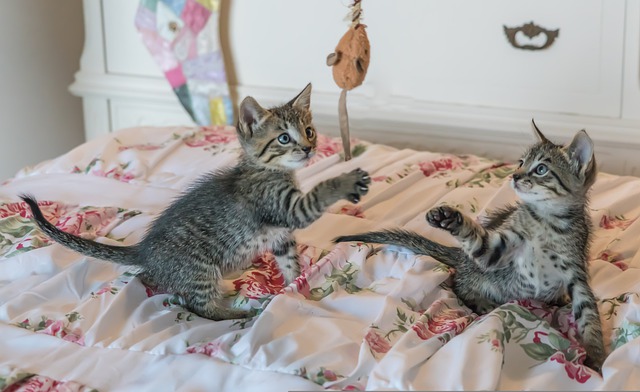
It is not recommended to use punishment in the case of cats and kittens. Any unwanted behavior should be resisted, and desirable behavior is to be rewarded, in this case, by gentle handling.
Note
Take note of the short handling sessions starting when kittens reach two weeks old. Then, they can progress to a minimum of 40 minutes per day, beyond feeding times, until they get seven weeks.
Remember that your kitten will also require plenty of rest to develop well. A good sleeping environment is essential for your kitten’s growth and health.
At this point, your kittens should be getting closer to becoming healthy, happy, and well-adjusted felines. They could be adopted at approximately 8-12 weeks, or you might choose to keep them and enjoy watching them grow.
No matter what you choose. you’ll be happy over the love and attention you’ve given them and. The connection you’ve built between your cat and kittens.

